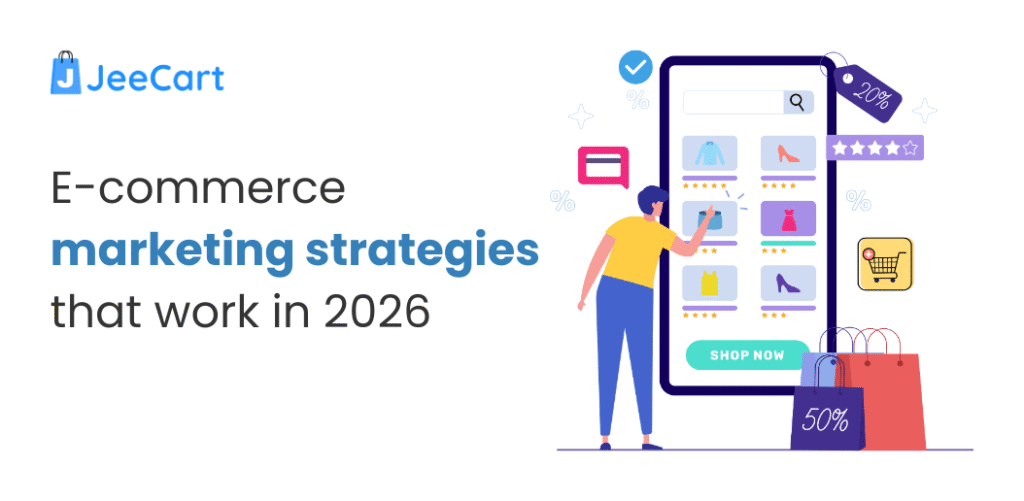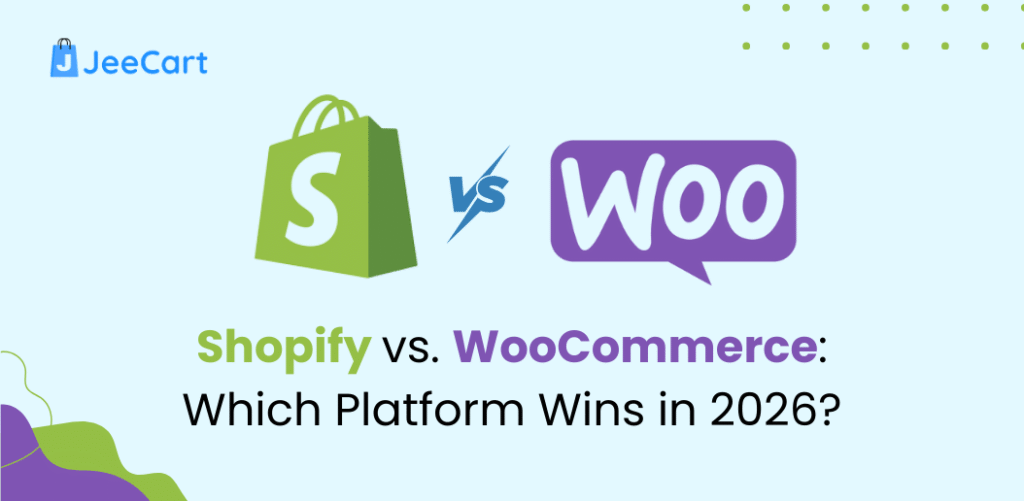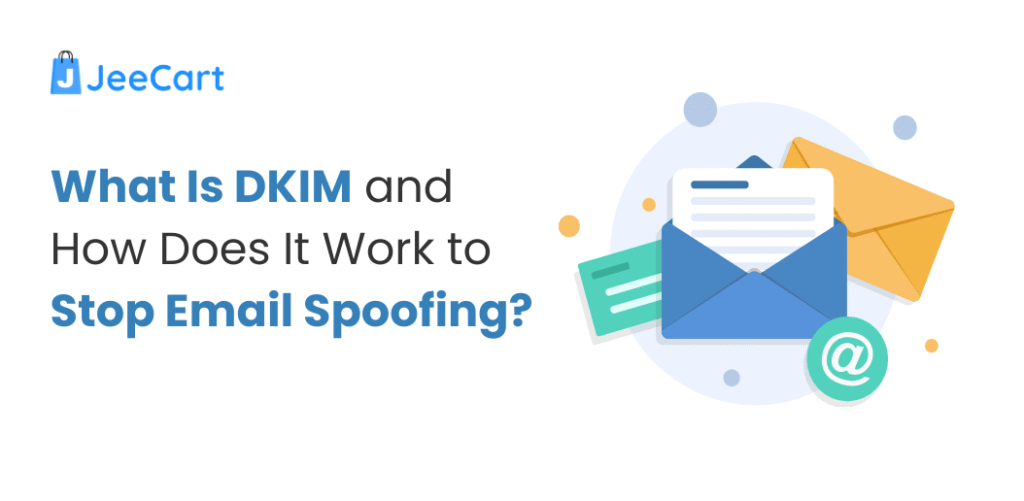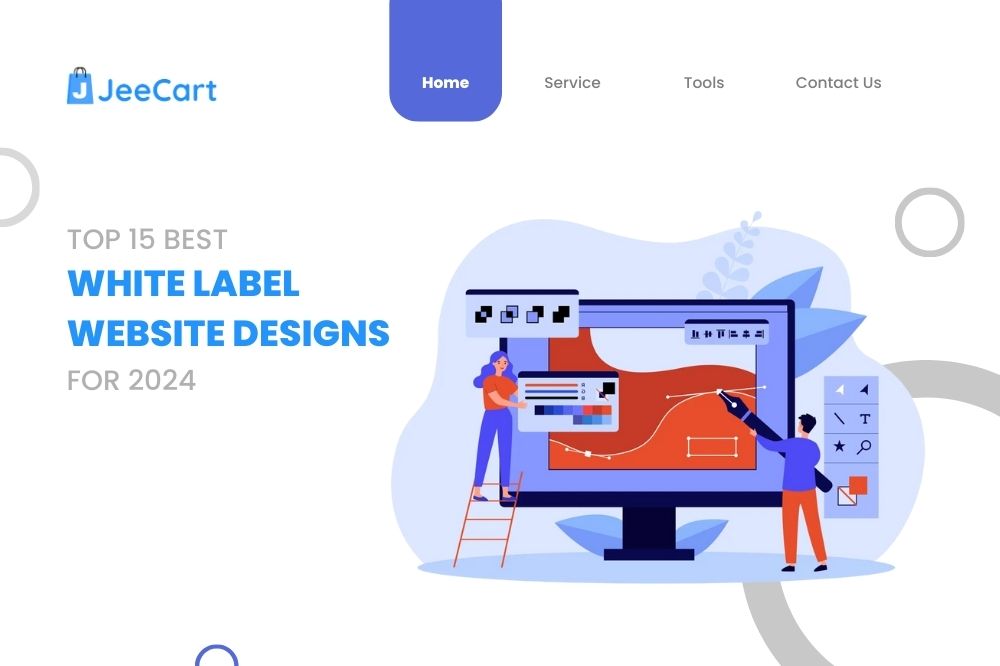
In the digital era, businesses are increasingly adopting white label website design to expand their services and improve efficiency. White label website design allows companies to provide custom-branded websites without the need for in-house development, leveraging the expertise of specialized providers. This strategy allows businesses to concentrate on their main strengths while providing top-quality websites to their clients.
As demand grows, we explore the 15 best white label website designs for 2024, detailing their features, pricing, pros, and cons to guide your selection.
What is a White Label Website Design?
A white label website design involves creating a website that is produced by one company but rebranded and sold by another as their own. This approach allows businesses to provide premium website design services to their clients without the need to develop these skills internally. The website builder white label provider handles the design, development, and maintenance, allowing the reseller to concentrate on marketing and customer support.
Benefits of Using White Labeling
- Cost-Effective: Saves on hiring, training, and infrastructure costs associated with developing an in-house team.
- Scalability: Easily scale your offerings to meet client demands without overextending your resources.
- Time-Saving: Quickly deliver professional services to clients without the lengthy development process.
- Focus on Core Competencies: Allows businesses to concentrate on their core strengths like marketing and customer relations.
- Consistency: Ensures uniformity and high standards in service delivery.
- Branding: Strengthen your brand by offering a comprehensive suite of services under your own name.
- Increased Revenue: Expand your service portfolio and increase potential revenue streams without substantial upfront investments.
15 Best White Label Website Designs
1. Shopify
Shopify is a robust eCommerce platform known for its ease of use and comprehensive features. It is designed to help businesses of all sizes set up and run online stores efficiently. Shopify supports a wide range of industries and offers a vast selection of apps and integrations to enhance its functionality.

Features:
- Customizable Templates: A variety of professional, mobile-responsive themes.
- SEO Tools: Built-in SEO features to improve search engine rankings.
- Integrated Payment Processing: Accept payments directly on your site.
- App Store: Hundreds of apps to add functionality, such as email marketing, social media integration, and inventory management.
- Multi-Channel Selling: Sell on platforms like Facebook, Instagram, and Amazon.
Pricing: Plans start at $29/month, with advanced plans up to $299/month. Also, Free trial is available.
Pros:
- User-friendly interface
- Extensive app ecosystem
- Excellent customer support
Cons:
- Transaction fees unless using Shopify Payments
- Limited customization on lower-tier plans
2. Wix
Wix offers a versatile platform with drag-and-drop functionality suitable for various website needs. It caters to both beginners and professionals, making it a popular choice for small businesses, personal websites, and online stores.

Features:
- Hundreds of Templates: Wide range of customizable and mobile-friendly templates.
- SEO Tools: Comprehensive SEO features including custom meta tags and automated SEO suggestions.
- App Market: Access to numerous apps for enhancing functionality, such as chat widgets, booking systems, and eCommerce tools.
- Wix ADI: Artificial Design Intelligence that creates a personalized website for you.
- Wix Code: Advanced coding capabilities for developers.
Pricing: Free plan available; premium plans start at $14/month.
Pros:
- Easy to use
- Large template selection
- Comprehensive support
Cons:
- Limited customization on the free plan
- Ads on free and lower-tier plans
3. Squarespace
Squarespace is known for its stunning design templates and intuitive user experience. It is ideal for creatives, such as photographers, artists, and small businesses, who need visually appealing websites.

Features:
- Responsive Design: Beautiful, mobile-friendly templates.
- Built-in SEO: Tools to enhance your site’s visibility on search engines.
- eCommerce Capabilities: Integrated eCommerce features for selling products and services online.
- Blogging Tools: Advanced blogging features including scheduling, categorization, and RSS feeds.
- Analytics: In-depth analytics to track site performance and visitor behavior.
Pricing: Plans start at $12/month, with advanced plans up to $40/month.
Pros:
- Beautiful, professional templates
- All-in-one platform
- Strong customer support
Cons:
- Slight learning curve for beginners
- Limited third-party integrations
4. HubSpot CMS Hub
HubSpot CMS Hub is a powerful platform integrating website management with CRM tools. It is designed for businesses looking to combine their website management with comprehensive marketing, sales, and service tools.
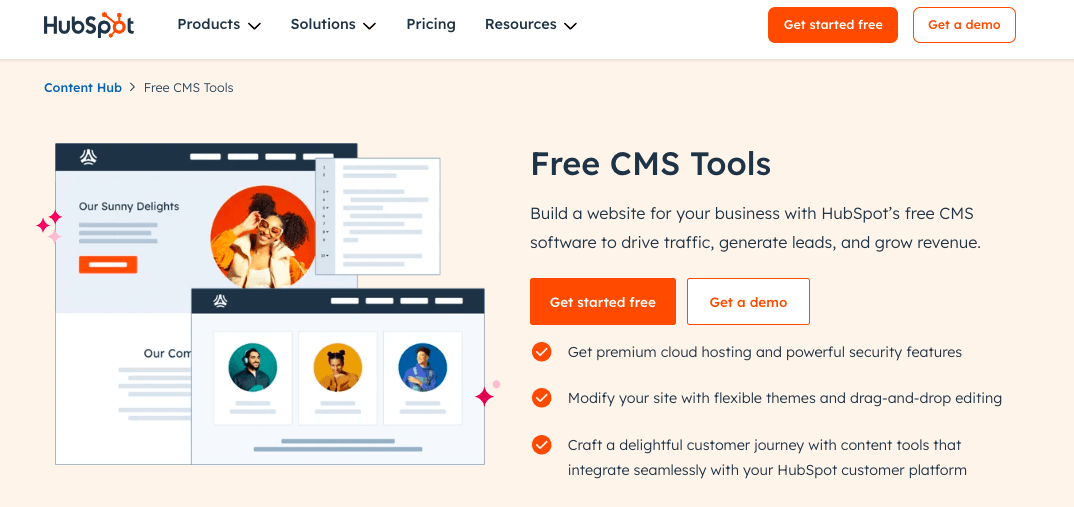
Features:
- Drag-and-Drop Editor: Easily create and customize your website without coding.
- Personalized Content: Deliver personalized content based on visitor behavior and preferences.
- Built-in Security: Advanced security features including SSL certificates and firewall protection.
- Analytics and Reporting: Detailed analytics to monitor site performance and user engagement.
- SEO Recommendations: Built-in SEO recommendations to optimize your content.
- CRM Integration: Seamless integration with HubSpot’s CRM for enhanced marketing and sales efforts.
Pricing: Plans start at $25/month.
Pros:
- Integrated CRM
- Personalized content options
- Strong analytics tools
Cons:
- Higher price point for advanced features
- Learning curve for new users
5. Strikingly
Strikingly specializes in creating single-page websites with a sleek and modern design. It is ideal for personal portfolios, small businesses, and event pages.
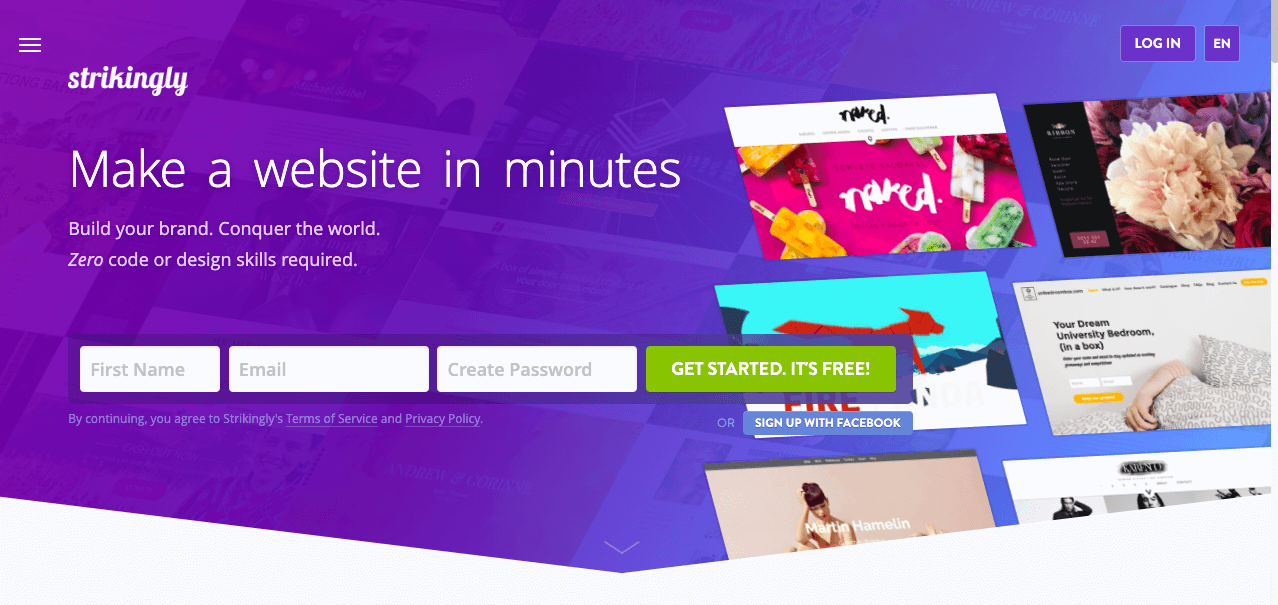
Features:
- Drag-and-Drop Editor: Simple drag-and-drop interface for quick website creation.
- Mobile Optimization: All websites are mobile-friendly by default.
- Analytics: Track visitor statistics and site performance.
- Social Media Integration: Connect your site with various social media platforms.
- eCommerce: Basic eCommerce features for selling products online.
Pricing: Free plan available; premium plans start at $8/month.
Pros:
- Very easy to use
- Great for single-page websites
- Affordable pricing
Cons:
- Limited to single-page design
- Fewer customization options
6. Brizy
Brizy is a user-friendly website builder with a focus on simplicity and ease of use. It is suitable for individuals, small businesses, and agencies looking for a quick and efficient way to build websites.
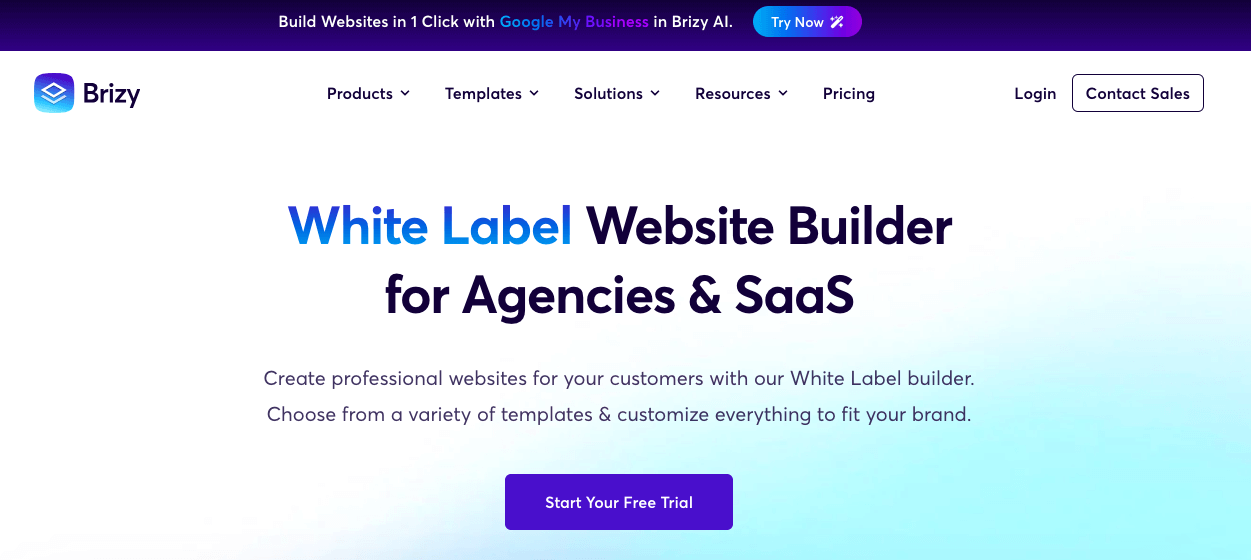
Features:
- Drag-and-Drop Builder: Intuitive drag-and-drop interface for easy website creation.
- Responsive Design: Websites are automatically optimized for mobile devices.
- Pre-made Blocks: Use pre-made design blocks to speed up the design process.
- Integration with Marketing Tools: Integrates with popular marketing tools like Mailchimp and HubSpot.
- Cloud Hosting: Offers cloud hosting with fast loading times.
- Collaboration Tools: Team collaboration features for working with clients and colleagues.
Pricing: Free plan available; premium plans start at $49/year.
Pros:
- Intuitive interface
- Affordable pricing
- Good selection of pre-made blocks
Cons:
- Limited advanced features
- Smaller template library
7. SiteSwan
SiteSwan is designed for small businesses, offering a straightforward and efficient website building experience. It is particularly suitable for agencies and resellers looking to provide local businesses with professional websites.
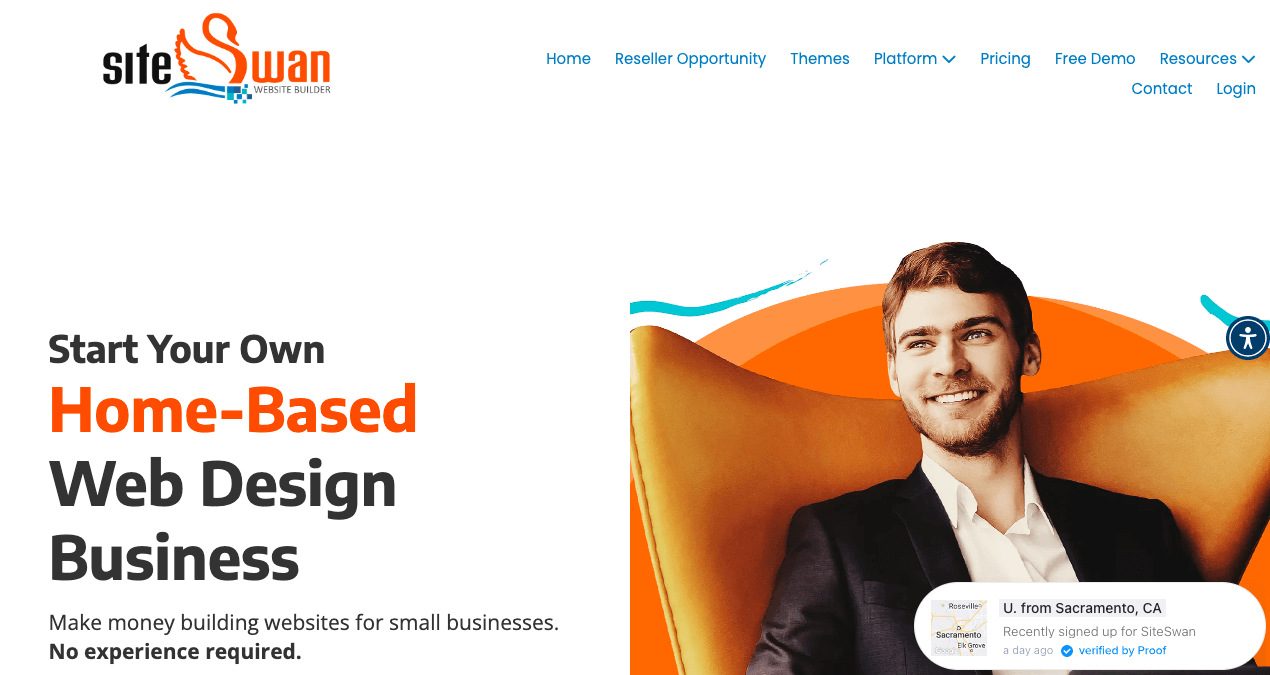
Features:
- Drag-and-Drop Builder: Easy-to-use drag-and-drop editor for building websites.
- SEO Tools: Built-in SEO tools to improve search engine rankings.
- Mobile Optimization: All sites are mobile-friendly.
- Lead Generation Tools: Features to help generate and manage leads.
- Client Management: Tools to manage client accounts and billing.
- White Label Options: Allows resellers to rebrand the platform as their own.
Pricing: Plans start at $47/month.
Pros:
- Focused on small businesses
- Easy to use
- Strong SEO tools
Cons:
- Higher pricing
- Limited to small business features
8. Weebly
Weebly is a popular website builder known for its ease of use and flexibility. It is ideal for personal websites, blogs, and small businesses looking to establish an online presence.
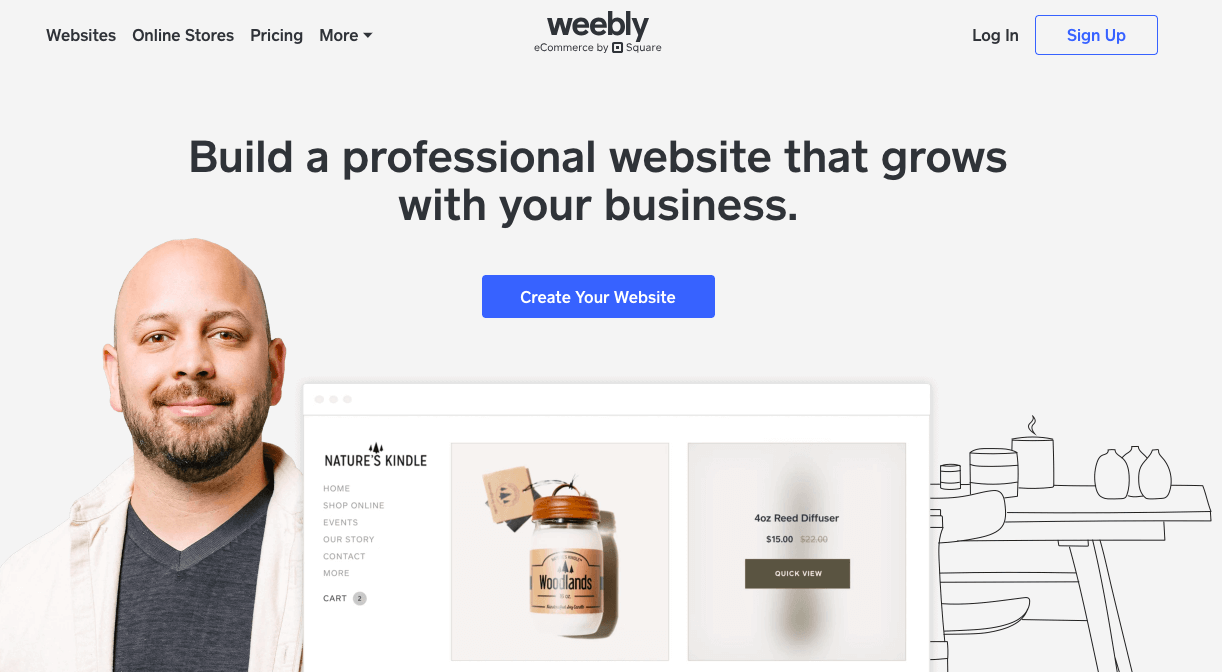
Features:
- Drag-and-Drop Builder: User-friendly drag-and-drop interface.
- eCommerce Tools: Comprehensive eCommerce features for online stores.
- Mobile Apps: Manage your site on the go with mobile apps.
- Integrated Marketing Tools: Built-in email marketing and social media integration.
- SEO Tools: Basic SEO tools to optimize your site.
Pricing: Free plan available; premium plans start at $6/month.
Pros:
- Very user-friendly
- Good eCommerce tools
- Affordable pricing
Cons:
- Limited customization options
- Ads on the free plan
9. Ucraft
Ucraft offers a powerful website builder with a focus on design and customization. It is suitable for designers, small businesses, and individuals looking to create visually appealing websites.
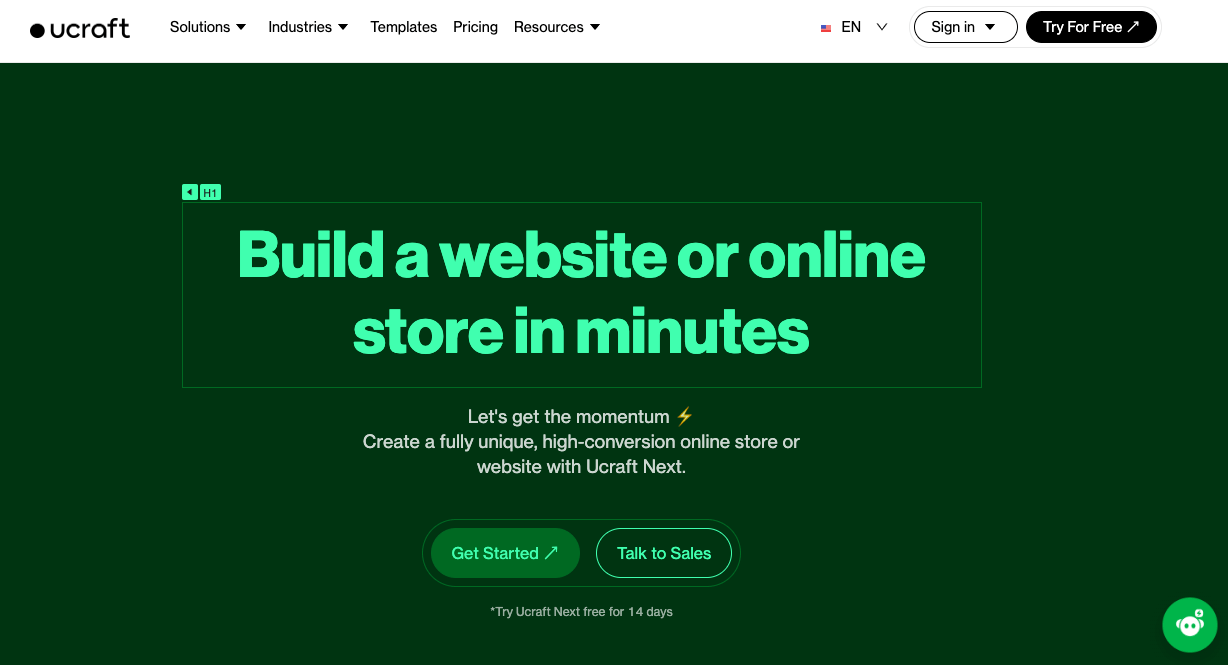
Features:
- Drag-and-Drop Editor: Easy-to-use editor with drag-and-drop functionality.
- SEO Tools: Advanced SEO tools to improve your site’s visibility.
- eCommerce Capabilities: Features for setting up and managing an online store
- Multilingual Support: Build websites in multiple languages to reach a global audience.
- Integrations: Integrate with various third-party tools like Google Analytics, Intercom, and more.
- Design Tools: Advanced design tools for creating unique and visually appealing websites.
Pricing: Free plan available; premium plans start at $10/month.
Pros:
- Strong design capabilities
- Multilingual support
- Good pricing
Cons:
- Slight learning curve
- Limited templates
10. Duda
Duda is white label web development platform focused on creating mobile-responsive websites quickly. It is designed for web professionals and agencies looking to streamline the website creation process.
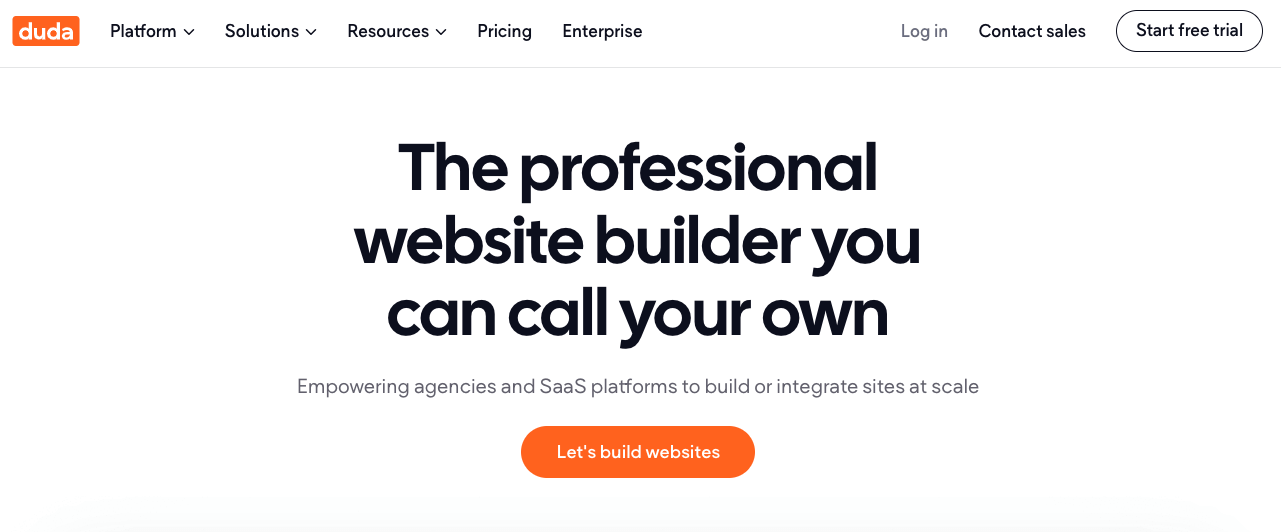
Features:
- Drag-and-Drop Builder: Intuitive drag-and-drop editor for building websites.
- Team Collaboration: Features for team collaboration and client feedback.
- Client Management: Manage client accounts and permissions.
- White Label Options: Rebrand the platform with your own branding.
- Analytics: Detailed analytics to track site performance.
- Widgets: Add custom widgets to enhance functionality.
Pricing: Plans start at $14/month.
Pros:
- Excellent mobile optimization
- Team collaboration features
- Strong client management tools
Cons:
- Higher pricing
- Limited templates
11. Simvoly
Simvoly offers a versatile website builder with eCommerce and funnel-building capabilities. It is ideal for businesses looking to create sales funnels and online stores.
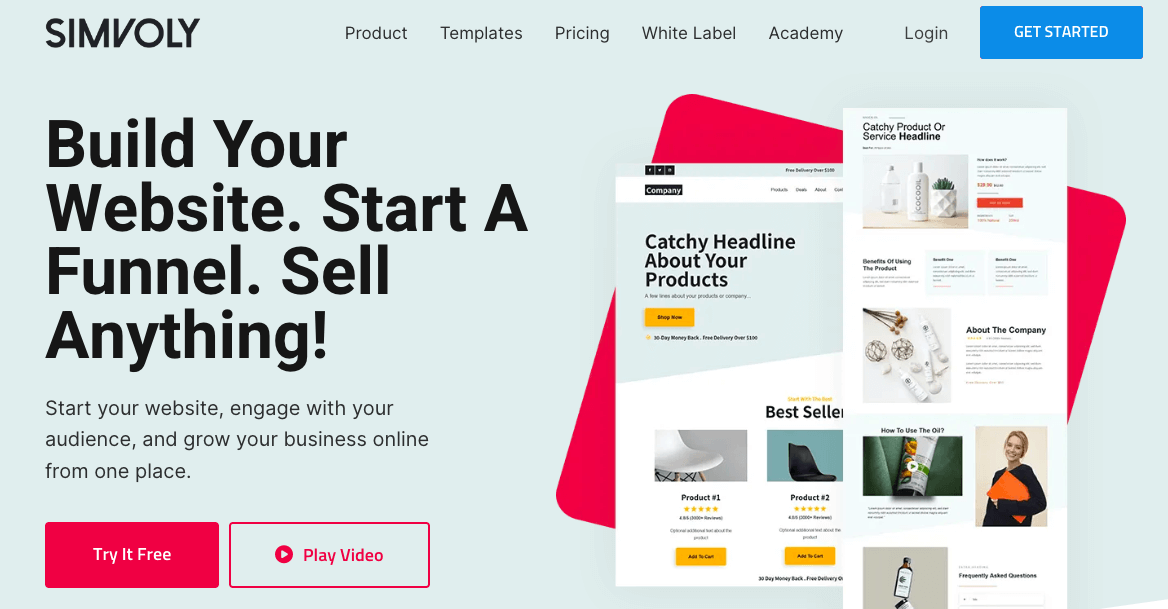
Features:
- Drag-and-Drop Builder: Easy-to-use builder with drag-and-drop functionality.
- eCommerce Tools: Comprehensive eCommerce features for managing an online store.
- Funnel Creation: Tools for creating and optimizing sales funnels.
- Analytics: Track site performance and visitor behavior.
- SEO Tools: Improve your site’s visibility with built-in SEO tools.
- Integrations: Integrate with third-party tools and services.
Pricing: Plans start at $12/month.
Pros:
- Funnel-building capabilities
- Good eCommerce tools
- Affordable pricing
Cons:
- Limited third-party integrations
- Fewer templates
12. WebWave
WebWave is a designer-focused website builder with advanced customization options. It is suitable for designers and agencies looking to create unique and highly customized websites.
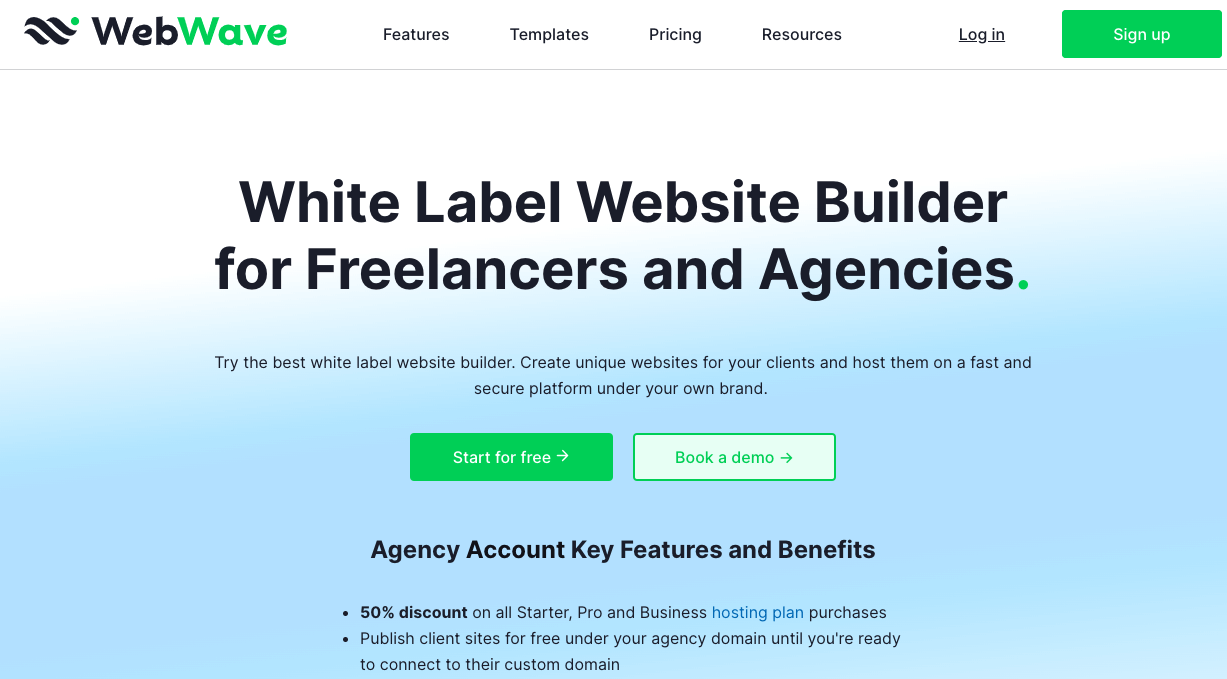
Features:
- Drag-and-Drop Builder: Advanced drag-and-drop builder for precise design control.
- SEO Tools: Optimize your site for search engines with built-in SEO tools.
- White Label Options: Rebrand the platform with your own branding.
- Client Management: Manage client accounts and billing.
- Custom Code: Add custom HTML, CSS, and JavaScript for advanced customization.
Pricing: Free plan available; premium plans start at $9/month.
Pros:
- Designer-friendly
- Strong customization options
- Affordable pricing
Cons:
- Higher learning curve
- Limited templates
13. Weblium
Weblium is an AI-powered website builder that simplifies the design process. It is ideal for small businesses and individuals looking for an easy and efficient way to create a website.
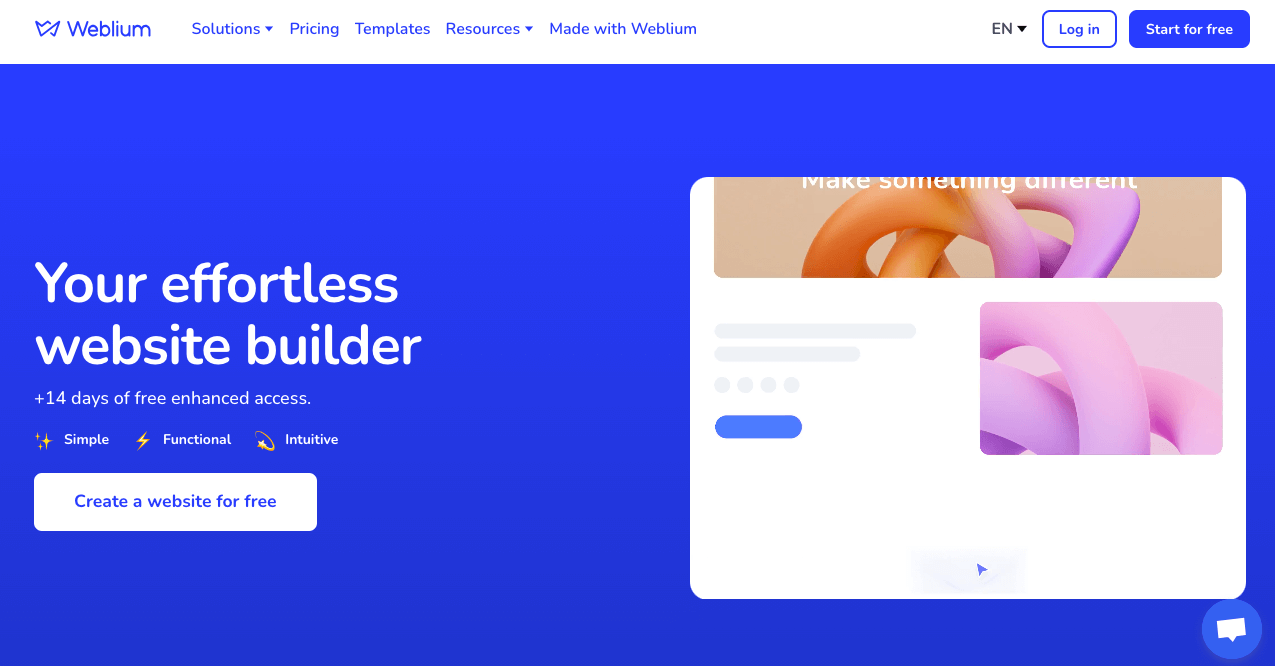
Features:
- AI Design Assistant: AI-powered design assistant to help you create a website quickly.
- Drag-and-Drop Editor: User-friendly editor with drag-and-drop functionality.
- SEO Tools: Improve your site’s visibility with built-in SEO tools.
- eCommerce Capabilities: Features for setting up and managing an online store.
Pricing: Plans start at $8.25/month.
Pros:
- AI design assistant
- Easy to use
- Good pricing
Cons:
- Limited customization options
- Fewer templates
14. IM Creator
IM Creator offers a simple and straightforward website building experience with a focus on simplicity. It is suitable for personal websites, portfolios, and small businesses.
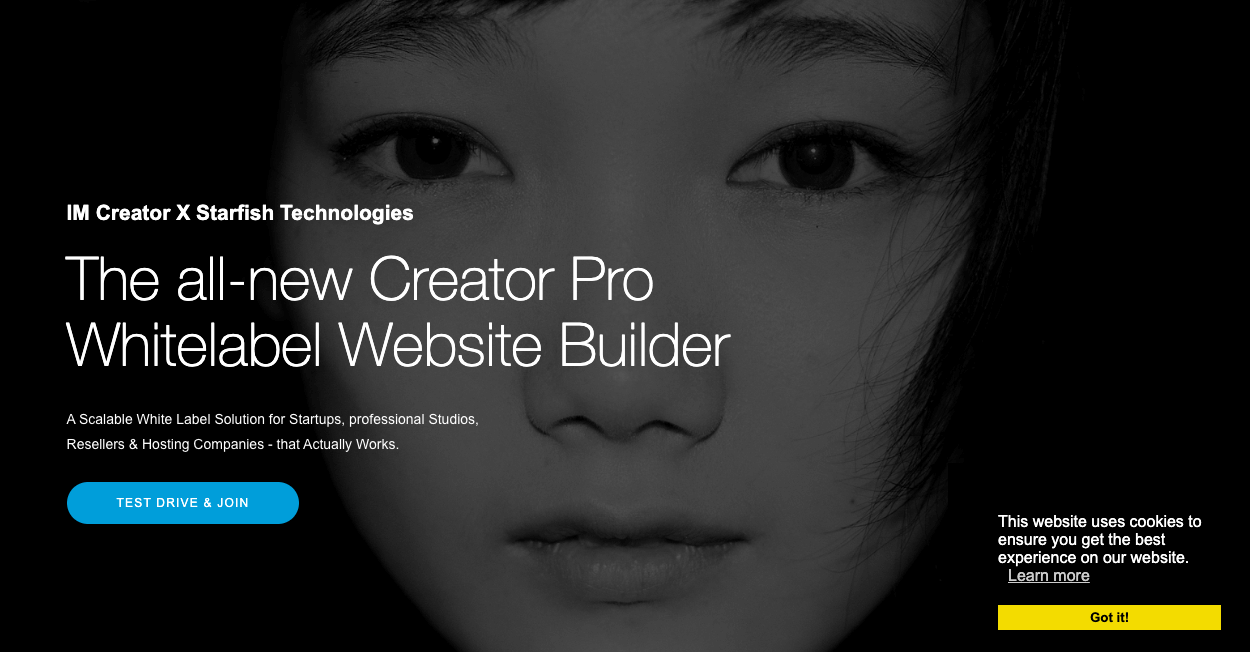
Features:
- Drag-and-Drop Editor: Easy-to-use editor with drag-and-drop functionality.
- SEO Tools: Improve your site’s visibility with built-in SEO tools.
- Mobile Optimization: All websites are mobile-friendly by default.
- eCommerce Capabilities: Basic eCommerce features for selling products online.
Pricing: Free plan available; premium plans start at $8/month.
Pros:
- Very easy to use
- Good pricing
- Mobile optimization
Cons:
- Limited advanced features
- Fewer templates
15. Ecwid
Ecwid is primarily an eCommerce platform that can be integrated into any website. It is ideal for businesses looking to add eCommerce functionality to their existing websites.
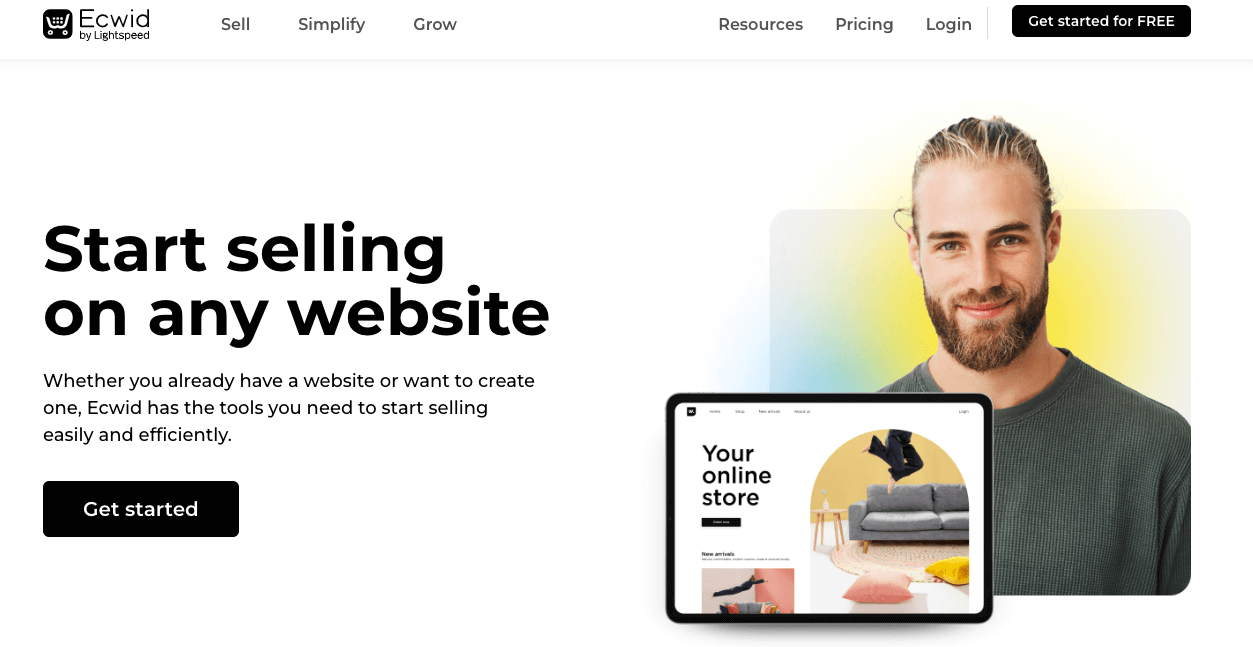
Features:
- Drag-and-Drop Editor: User-friendly editor for customizing your online store.
- Mobile Optimization: All stores are optimized for mobile devices.
- SEO Tools: Improve your store’s visibility with built-in SEO tools.
- Multi-Channel Selling: Sell on platforms like Facebook, Instagram, and Amazon.
- Inventory Management: Manage inventory and orders from a single dashboard.
- Payment Processing: Integrated payment processing options.
Pricing: Free plan available; premium plans start at $15/month.
Pros:
- Strong eCommerce capabilities
- Can integrate into existing websites
- Multi-channel selling
Cons:
- Primarily eCommerce focused
- Limited website building features
Choose the Right White Label Website Builder
Selecting the 10 web white label website builder depends on your specific needs and the nature of your business. Consider the following factors:
- Ease of Use: Ensure the platform is user-friendly and easy to navigate.
- Features: Look for features that align with your business goals, such as SEO tools, eCommerce capabilities, and customization options.
- Pricing: Compare pricing plans to find one that fits your budget.
- Support: Check the level of customer support provided, including availability and responsiveness.
- Scalability: Choose a platform that can grow with your business and accommodate increasing demands.
Best White Label Website Design – FAQs:
Can you white label Wix?
Yes, Wix offers a white label solution through its Wix Partners program, allowing agencies to rebrand and resell Wix’s services under their own brand.
What is a white label builder?
A white label builder is a website building platform that allows companies to rebrand the software and sell it as their own, providing website design and development services to their clients.
What is the meaning of white labelling?
White labeling is the process of buying a product or service from a supplier and rebranding it to sell as your own. This enables businesses to introduce new services without having to create them internally.
What is white label marketing software?
White label marketing software is a tool or platform developed by one company and rebranded for sale by another company under its own brand. This software typically offers features such as email marketing, social media management, SEO, and analytics.
The Conclusion
Choosing the right the best white label website design is crucial for businesses looking to expand their service offerings and increase revenue. Each of the platforms listed above offers unique features and benefits, catering to different needs and preferences. By considering factors such as ease of use, features, pricing, support, and scalability, you can find the best white label website builder to suit your business goals and help you deliver high-quality websites to your clients.


